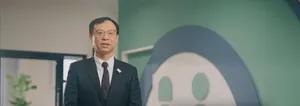Breast cancer and tech...a reason for optimism

I was diagnosed with breast cancer twice, in 2001 and again in 2004. Thanks to early detection and access to extraordinary care—including multiple rounds of chemo, radiation and more surgery than any one person should ever have in a lifetime—I’m still here and able to write this piece. In fact, I’ve probably never been healthier.
I remember receiving the news. I was initially terrified. Our three kids were only five, seven, and nine at the time of my first diagnosis, and all I wanted was to live to see them grow up. I’m grateful I had options and access to treatments, but no aspect of it was pleasant. Last year, I had the joy of seeing our youngest son graduate from college. In the years since I first learned of my cancer, there’s been remarkable progress in global health care, augmented with pioneering work from medical researchers and technology companies. I know how incredibly fortunate I am, but I also know that for far too many, a diagnosis comes too late and the best care is beyond reach.
And that’s where Google has focused its work: to bring healthcare innovations to everyone. Working at Google, I have had a front-row seat to these technological breakthroughs.
During the past few years, teams at Google have applied artificial intelligence (AI) to problems in healthcare—from predicting patient outcomes in medical records to helping detect diseases like lung cancer. We’re still early on in developing these technologies, but the results are promising.
When it comes to breast cancer, Google is looking at how AI can help specialists improve detection and diagnosis. Breast cancer is one of the most common cancers among women worldwide, taking the lives of more than 600,000 people each year. Thankfully, that number is on the decline because of huge advances in care. However, that number could be even lower if we continue to accelerate progress and make sure that progress reaches as many people as possible. Google hopes AI research will further fuel progress on both detection and diagnosis.
Early detection depends on patients and technologies, such as mammography. Currently, we rely on mammograms to screen for cancer in otherwise healthy women, but thousands of cases go undiagnosed each year and thousands more result in confusing or worrying findings that are not cancer or are low risk. Today we can’t easily distinguish the cancers we need to find from those that are unlikely to cause further harm. We believe that technology can help with detection, and thus improve the experience for both patients and doctors.
Just as important as detecting cancer is determining how advanced and aggressive the cancer is. A process called staging helps determine how far the cancer has spread, which impacts the course of treatment. Staging largely depends on clinicians and radiologists looking at patient histories, physical examinations and images. In addition, pathologists examine tissue samples obtained from a biopsy to assess the microscopic appearance and biological properties of each individual patient’s cancer and judge aggressiveness. However, pathologic assessment is a laborious and costly process that--incredibly--continues to rely on an individual evaluating microscopic features in biological tissue with the human eye and microscope!
Last year, Google created a deep learning algorithm that could help pathologists assess tissue and detect the spread and extent of disease better in virtually every case. By pinpointing the location of the cancer more accurately, quickly and at a lower cost, care providers might be able to deliver better treatment for more patients. But doing this will require that these insights be paired with human intelligence and placed in the hands of skilled researchers, surgeons, oncologists, radiologists and others. Google’s research showed that the best results come when medical professionals and technology work together, rather than either working alone.
During my treatment, I was taken care of by extraordinary teams at Memorial Sloan Kettering in New York where they had access to the latest developments in breast cancer care. My oncologist (and now good friend), Dr. Clifford Hudis, is now CEO of the American Society of Clinical Oncology (ASCO), which has developed a nonprofit big data initiative, CancerLinQ, to give oncologists and researchers access to health information to inform better care for everyone. He told me: “CancerLinQ seeks to identify hidden signals in the routine record of care from millions of de-identified patients so that doctors have deeper and faster insights into their own practices and opportunities for improvement.” He and his colleagues don't think they’ll be able to deliver optimally without robust AI.
What medical professionals, like Dr. Hudis and his colleagues across ASCO and CancerLinQ, and engineers at companies like Google have accomplished since the time I joined the Club in 2001 is remarkable.
I will always remember words passed on to me by another cancer survivor, which helped me throughout my treatment. He said when you’re having a good day and you’ve temporarily pushed the disease out of your mind, a little bird might land on your shoulder to remind you that you have cancer. Eventually, that bird comes around less and less. It took many years but I am relieved to say that I haven’t seen that bird in a long time, and I am incredibly grateful for that. I am optimistic that the combination of great doctors and technology could allow us to get rid of those birds for so many more people.







